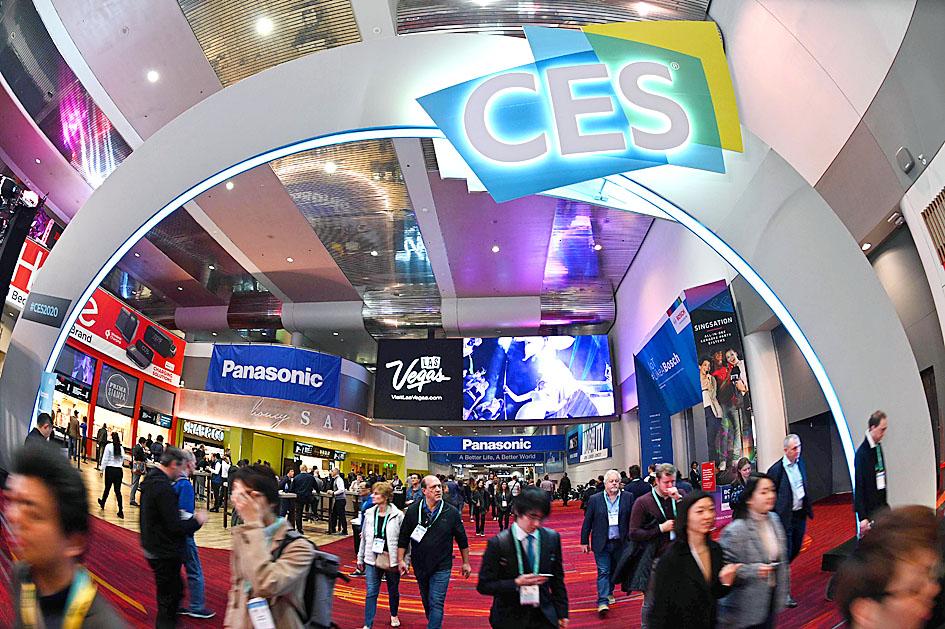A total of 100 Taiwan-based start-ups are showcasing their products at this year’s Consumer Electronics Show (CES), which opened yesterday and runs until Thursday, and is being held virtually for the first time amid the COVID-19 pandemic.
The Ministry of Science and Technology’s Taiwan Tech Arena has created a virtual reality (VR) pavilion at CES, the world’s leading electronics show, where the start-ups can show their innovative capabilities to potential buyers.
Taiwan Tech Arena is a platform aimed at cultivating tech start-ups by helping them raise funds.

Photo: AFP
At a news conference in Taipei, Minister of Science and Technology Wu Tsung-tsong (吳政忠) said that the ministry teamed up with other government agencies, local governments and academia to choose the 100 start-ups from 207 candidates.
The start-ups largely come from the medical care, information security and smart living sectors, the ministry said.
Taiwanese start-ups have since 2018 attended CES, which is normally held in Las Vegas, Nevada. The number of exhibitors grew from 32 in 2018 and 44 in 2019, the ministry said.
As start-ups generally lack experience in promoting themselves in the global market, Taiwan Tech Arena and the VR Taiwan pavilion can help them promote their products and smart solutions at CES and on the world stage, the ministry said.
In the VR pavilion, a TourRing app takes potential buyers on a quick tour of the virtual venue, and allows them to quickly access the types of products and innovations they are interested in, it said.
Hsu Tseng-ju (許增如), director of the Department of Academia-Industry Collaboration and Science Park Affairs, said Taiwanese start-ups have received a combined NT$2 billion (US$70.21 million) of orders at CES over the past three years, and she expects them to continue to receive orders this year.
The VR pavilion would continue to operate for a year to create more business opportunities for the participating start-ups, she added.

To many, Tatu City on the outskirts of Nairobi looks like a success. The first city entirely built by a private company to be operational in east Africa, with about 25,000 people living and working there, it accounts for about two-thirds of all foreign investment in Kenya. Its low-tax status has attracted more than 100 businesses including Heineken, coffee brand Dormans, and the biggest call-center and cold-chain transport firms in the region. However, to some local politicians, Tatu City has looked more like a target for extortion. A parade of governors have demanded land worth millions of dollars in exchange

Hong Kong authorities ramped up sales of the local dollar as the greenback’s slide threatened the foreign-exchange peg. The Hong Kong Monetary Authority (HKMA) sold a record HK$60.5 billion (US$7.8 billion) of the city’s currency, according to an alert sent on its Bloomberg page yesterday in Asia, after it tested the upper end of its trading band. That added to the HK$56.1 billion of sales versus the greenback since Friday. The rapid intervention signals efforts from the city’s authorities to limit the local currency’s moves within its HK$7.75 to HK$7.85 per US dollar trading band. Heavy sales of the local dollar by

Taiwan Semiconductor Manufacturing Co’s (TSMC, 台積電) revenue jumped 48 percent last month, underscoring how electronics firms scrambled to acquire essential components before global tariffs took effect. The main chipmaker for Apple Inc and Nvidia Corp reported monthly sales of NT$349.6 billion (US$11.6 billion). That compares with the average analysts’ estimate for a 38 percent rise in second-quarter revenue. US President Donald Trump’s trade war is prompting economists to retool GDP forecasts worldwide, casting doubt over the outlook for everything from iPhone demand to computing and datacenter construction. However, TSMC — a barometer for global tech spending given its central role in the

An Indonesian animated movie is smashing regional box office records and could be set for wider success as it prepares to open beyond the Southeast Asian archipelago’s silver screens. Jumbo — a film based on the adventures of main character, Don, a large orphaned Indonesian boy facing bullying at school — last month became the highest-grossing Southeast Asian animated film, raking in more than US$8 million. Released at the end of March to coincide with the Eid holidays after the Islamic fasting month of Ramadan, the movie has hit 8 million ticket sales, the third-highest in Indonesian cinema history, Film